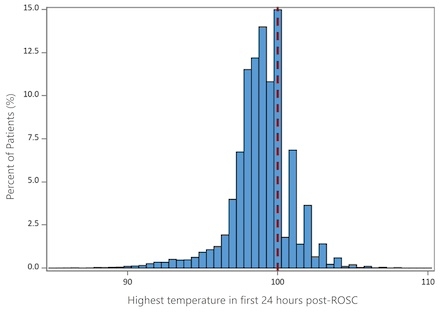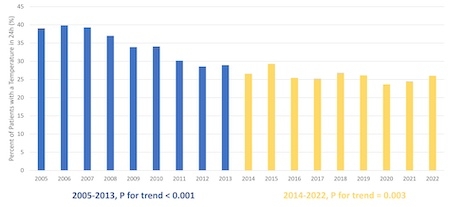Final ID: Su1203
Temporal Trends in Post-Resuscitation Fever After In-Hospital Cardiac Arrest
Abstract Body:
Background:
A goal of post-resuscitation care among patients successfully resuscitated from in-hospital cardiac arrest (IHCA) is avoidance of fever. However, the incidence of post-resuscitation fever after the initial therapeutic hypothermia trials in 2002 and after the recent Targeted Temperature Management (TTM) trial in 2013 is unknown.
Objective:
Examine temporal trends in fever during the first 24 hours after return of spontaneous circulation (ROSC) from IHCA during 2005-2013 (after the initial hypothermia trials) and then during 2014-2022 (after the TTM trial).
Methods:
Within the Get With The Guidelines-Resuscitation registry for IHCA in the U.S., we identified adult patients with ROSC after an index IHCA from 127 hospitals that submitted data on IHCA during both time periods between 2005 and 2022. Patients with sepsis and COVID-19 infection were excluded. We evaluated temporal trends in post-resuscitation fever (defined as >100 °F) during 2005-2013 after the initial hypothermia trials, and then between 2014-2022 after the TTM trial.
Results:
Among 41,155 patients with ROSC after IHCA, the mean age was 64.8 years (±15.0); 60.0% were male, and 68.6% were of White race. Overall, 11,745 (28.5%) developed post-resuscitation fever (Figure 1). Following the therapeutic hypothermia trials in late 2002, the incidence of fever decreased from 39.1% in 2005 to 29.0% in 2013 (P for trend < 0.001) (Figure 2). After the publication of the TTM trial in late 2013, post-resuscitation fever in the years 2014-2022 did not go up but declined more modestly (P for trend = 0.003).
Conclusions:
Between 2005 and 2013, the incidence of post-resuscitation fever after IHCA decreased substantially. Since the publication of the TTM trial in late 2013, fever incidence has not increased; rather, it has remained relatively stable, even as reported use of therapeutic hypothermia has declined.
Background:
A goal of post-resuscitation care among patients successfully resuscitated from in-hospital cardiac arrest (IHCA) is avoidance of fever. However, the incidence of post-resuscitation fever after the initial therapeutic hypothermia trials in 2002 and after the recent Targeted Temperature Management (TTM) trial in 2013 is unknown.
Objective:
Examine temporal trends in fever during the first 24 hours after return of spontaneous circulation (ROSC) from IHCA during 2005-2013 (after the initial hypothermia trials) and then during 2014-2022 (after the TTM trial).
Methods:
Within the Get With The Guidelines-Resuscitation registry for IHCA in the U.S., we identified adult patients with ROSC after an index IHCA from 127 hospitals that submitted data on IHCA during both time periods between 2005 and 2022. Patients with sepsis and COVID-19 infection were excluded. We evaluated temporal trends in post-resuscitation fever (defined as >100 °F) during 2005-2013 after the initial hypothermia trials, and then between 2014-2022 after the TTM trial.
Results:
Among 41,155 patients with ROSC after IHCA, the mean age was 64.8 years (±15.0); 60.0% were male, and 68.6% were of White race. Overall, 11,745 (28.5%) developed post-resuscitation fever (Figure 1). Following the therapeutic hypothermia trials in late 2002, the incidence of fever decreased from 39.1% in 2005 to 29.0% in 2013 (P for trend < 0.001) (Figure 2). After the publication of the TTM trial in late 2013, post-resuscitation fever in the years 2014-2022 did not go up but declined more modestly (P for trend = 0.003).
Conclusions:
Between 2005 and 2013, the incidence of post-resuscitation fever after IHCA decreased substantially. Since the publication of the TTM trial in late 2013, fever incidence has not increased; rather, it has remained relatively stable, even as reported use of therapeutic hypothermia has declined.
More abstracts on this topic:
A Case of Successful Resuscitation After Out-of-hospital Cardiac Arrest Caused by Undiagnosed Pheochromocytoma-induced Cardiomyopathy
Hatakeyama Toshihiro, Suetsugu Yusuke, Watanabe Kaoru, Matsushima Hisao
Evaluation of Factors Impacting Community Race and Ethnicity Outcome Disparities for Out-of-Hospital Cardiac Arrest Using Mediation AnalysisHuebinger Ryan, Norii Tatsuya, Witkov Richard, Waller-delarosa John, Yang Mingan, Page-reeves Janet, Mcnally Bryan, Bobrow Bentley


